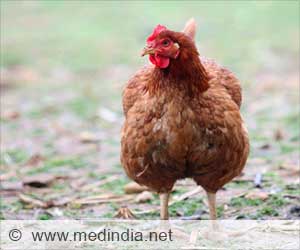Vaccine that protects against pathogenic bird flu and its evolving forms is at the moment under development by scientists led by a researcher of Indian-origin.
Vaccine that protects against pathogenic bird flu and its evolving forms is at the moment under development by scientists led by a researcher of Indian-origin.
Unlike traditional influenza vaccines, the new vaccine could be produced quickly and stored for long periods in preparation for a pandemic of dangerous disease-causing avian influenza - H5N1 - and its variants, said Suresh Mittal, a Purdue virologist.Researchers at Purdue University and the Centers for Disease Control and Prevention who discovered the new preventative drug and tested it in mice, found that the vaccine protected against H5N1 for a year or longer.
Because the studies have only been done in mice, it's not yet known whether the same results will be obtained in humans.
"We want to have a vaccine that can be stored in advance and have the potential to provide protection for a period of time until we can change the vaccine to match the latest form of avian influenza," Mittal said.
"The combination of flu genes that we've used to produce the vaccine, I think, will provide that capability," he added.
The importance of having a long-lasting, broadly protective vaccine is that it would give some cross-protection against new viruses with pandemic potential caused by mutations in currently circulating H5N1 viruses.
Advertisement
To produce the new vaccine, the scientists used a mutated common cold virus, known as an adenovirus, as a delivery system for important genes from two types of the H5N1 avian influenza.
Advertisement
Problems with current influenza vaccines include that they are made from eggs, a process that can take as long as six months. The vaccine Mittal and his research team has developed isn't grown in eggs, making vaccine production much faster.
Additionally it would be difficult under normal conditions to produce the hundreds of millions of doses needed to protect everyone at risk for highly pathogenic forms of bird flu. With the beginning of a pandemic, since H5N1 decimates poultry populations, the egg supply needed to produce vaccines would be drastically cut.
The new vaccine uses an adjuvant, molecules added to the vaccine that stimulate the body's immune system, so that lower doses of the vaccine can be used. The adjuvant also allows the vaccine to be stockpiled so more people can be vaccinated, and it helps the vaccine protect against variant forms of the H5N1. The only FDA-approved H5N1 vaccine protects against only that specific strain of flu and only works in about 60 percent of those immunized with a high dose.
The study is published in The Journal of Infectious Diseases.
Source-ANI
KAV/L






